- Home
- Alton Gansky
Plot Line
Plot Line Read online
Plot Line
Copyright 2012 Alton Gansky.
ISBN: 9781476131276
All rights reserved. No part of this book may be reproduced without written permission, except for brief quotations in books and critical reviews.
Smashwords Edition, License Notes
This ebook is licensed for your personal enjoyment only. This ebook may not be re-sold or given away to other people. If you would like to share this book with another person, please purchase an additional copy for each recipient. If you’re reading this book and did not purchase it, or it was not purchased for your use only, then please return to Smashwords.com and purchase your own copy. Thank you for respecting the hard work of this author.
Scripture quotations taken from the New American Standard Bible®, Copyright © 1960, 1962, 1963, 1968, 1971, 1972, 1973, 1975, 1977, 1995 by The Lockman Foundation Used by permission." (www.Lockman.org)
Cover by Gansky.Communications
Images: © jorgophotography - Fotolia.com; © Stocksnapper - Fotolia.com
There are places we were never meant to go.
Ray Beeman went.
Ray Beeman is a man in pursuit of a dream. With two published novels under his belt he knew he was on his way. Then his publisher went bankrupt. His future went dark. No money, no income, no profession. Could he start over? Yes, with the help of a stranger who offers him a dream job that allows him to continue writing. All he has to do is make up “PR” plot lines for a government agency. Not hard for a man with an active imagination. Dream jobs, Ray learns, often come with nightmares. Forced to see what no man should; forced to go where no person was meant to step; drawn across a threshold between worlds, Ray pays for his lucrative job with his sanity. Terrified as he is, he fears one fact more: His actions have put his family in peril.
There are worse things than evil men.
Part 1
Man's steps are ordained by the LORD, how then can man understand his way?—Proverbs 20:24
One
There was a deep ache in the center of Ray Beeman’s chest; an unrelenting burning that grew hotter each passing moment. He rubbed his sternum and stared at the envelope before him. The envelope hadn’t changed. It was the same ivory color with his name and address typed neatly in the center of it. In the upper left corner was the blue and red logo of Prestige Publishing. Several lines of black ink were etched through the return address. Ray had made the marks himself, scoring each stripe deep enough to tear the fibers of the paper. His hand shook with each stroke as if he had been stricken with palsy.
“Did you write this?”
The words echoed distantly in Ray’s ears. He didn’t look up. Instead, he gouged another line through the return address.
The mail had come early that afternoon and Ray met the mailman on the front porch as he left the house. Already late, Ray did nothing more than say hello and take the small stack of letters from the postman’s outstretched hand. The mail remained unopened until he had arrived at the Wenham Mall in Temecula, California. The drive from his home in Riverside to Temecula took twenty-five minutes longer than the half-hour he had planned, all of which he spent in stop-and-go traffic while State road workers reduced four lanes of freeway to an inadequate two. Outside, thick, gray January clouds blanketed the sky.
“Is this a novel?” the voice asked again.
Ray had arrived at the book signing twenty minutes late of the scheduled 2:00 start time. He parked his car in one of the stalls of the expansive asphalt lot and walked as quickly as he could through the slow moving shoppers, apologizing each time he bumped into someone who, unlike him, had all the time in the world. Ray nearly slipped on the highly polished floor as he scurried into Tillman’s bookstore. His haste had been wasted. Although the book signing had been scheduled eight weeks before (he had scheduled it himself) no one in the shop remembered it. Still, they set up a small card table in the front corner of the store, just a short distance from the wide corridor where shoppers strolled.
He had other problems. Since no one remembered he would be in the store signing books, no books had been ordered. The store had only a single copy of Tender Hate, his first novel, and two volumes of Love’s Labor Lost, his most recent publication. Fortunately Ray had a box of each title in the trunk of his car. It was a precaution he learned after a similar oversight during his first book signing. After a quick trip to his vehicle and back, Ray was ready to sign books—if anyone would stop. Few did.
With time on his hands, Ray read through the mail he had brought with him, dropping each opened letter in one of the boxes of books he had brought. It was the fourth letter that caught his attention—the letter from his publisher. He read it twice, then a third time, hoping the words would rearrange themselves into a different announcement, but the words stayed where they were. Unmoving, cold words that at first chilled him then filled him with the heat of anger.
“Hello? Anybody home?”
Ray looked up and saw a rotund woman in a bright blue dress with a large, gaudy, yellow flower print standing before him. She held Tender Hate in her hand.
“I’m sorry,” Ray stuttered, not feeling sorry at all. “I was lost in thought.”
“So I see. I’ve been talking to you for the last five minutes.”
Ray doubted the claim but saw no benefit in arguing. “I apologize again. You had a question?”
“Did you write this?” Her voice was sharp, her words clipped as if she were conserving her energy for some other cause.
“Yes. That’s my first novel. It came out a year ago February. This one,” he picked up Love’s Labor Lost, “came out three months ago.”
“Is it fiction?”
That’s what a novel is, lady. How many non-fiction novels can you name? “Yes.” The politeness was forced. “It’s fiction.”
She harrumphed and an expression of distaste draped her face. “I see.” She set the book down as if it had soiled her hands.
“Do you like to read fiction?” Ray was sure of the answer, but perhaps he could make a convert.
“I don’t have time for such things. Life is too short to give one’s attention over to trivial matters.”
Trivial matters? The burning in Ray’s chest grew hotter and his already churning stomach flipped again. “Novels are hardly trivial ma’am. The novel has changed lives. Many attribute the English laws ending child abuse to the works of Dickens and . . .”
“I didn’t come here to be argued with,” the woman snapped.
The muscles in the back of Ray’s neck tightened like compressed steel springs. His head was pounding with pain. “Then why don’t you hop back on your broom and fly home.”
Ray regretted the words. By nature he was quiet and introspective, avoiding confrontation whenever possible. Today, however, he was not himself. It was the letter’s fault. That blasted letter had ruined everything.
“You can’t talk to me that way.” The woman snorted. “You might sell more books if you learned to keep a civil tongue.”
Ray lowered his head and rubbed his temples. He felt ill. Already he had been at the bookstore for two hours and only five people had stopped to look at his books, six counting the woman who was too busy to read novels, but had plenty of time to insult the work of his life. None had bought books. He had been tempted to pay people to take them, but that would have required money in the bank, something he didn’t have.
“What? Nothing to say now?” the woman prodded. “I don’t imagine your books have much to say either. Maybe I should have a conversation with the store manager.”
“I don’t work for the bookstore, lady, I’m a writer.”
“I don’t care. They shouldn’t allow rude people like you to sit in their storefront.”
Ray closed his eyes and wish
ed he were somewhere else.
“A conversation,” said a new voice, “would require you listen—a skill I’m sure you lack.”
Ray snapped his eyes open and saw a trim man in a black, collarless tee shirt and beige sport coat. His hair was black with touches of gray at the temple. The man glanced at Ray through steel blue eyes. His posture was erect, but relaxed, his expression unperturbed yet commanding. Pulling a silver object from his pocket, he began to make a clicking sound. Ray saw a square, shiny cigarette lighter, the kind his father had used to light his Meerschaum pipe many years before.
Click, click, click.
“Wha . . . what?” the woman stammered.
“Listen lady, this man has written more books than you’ve read, and he’s only written two. Two excellent books I might add.”
The red of anger crept up the woman’s face. “You . . . you wouldn’t talk to me like that if my husband were here.”
“If your husband were here, I’d fold him into a tiny wad and swallow him whole,” the man said. His voice was clear, strong but free of any anger. He spoke like a professor reciting facts.
“I should call security on you.”
“What makes you think I’m not with security?”
The woman stuttered, sputtered and grasped for words as a drowning man would grasp for a life preserver. Finally she spun on her heels and walked away in a huff.
“I appreciate the help,” Ray said, “but I hope she doesn’t get you in trouble with your superiors.”
The man laughed easily, smoothly. “I don’t work for security. I was just trying to keep her off guard.”
“I’d say you did that.”
“She had it coming. Some people can’t be happy unless they’re making someone else miserable.”
“True. I’m Ray Beeman.” He stood and offered his hand, which the stranger took immediately. His grip was strong, his handshake confident.
“My name is Devlin Chambers and I know who you are. I’ve read your books. I’m a fan.” Devlin put the lighter back in his pocket.
“Really? So you’re the one.”
Devlin laughed again. “I’m sure I’m not the only one. You have many fans and will have many more.”
Ray sighed and sat. “I’m not sure about that.” He looked at the envelope again and the cold fog of despair surrounded him.
“Bad news?” Devlin nodded at the envelope.
Ray hesitated. This wasn’t something he wanted to talk about, especially to a stranger. “I’ve had better letters.”
“Judging by what you’ve done to the logo, it must have struck you pretty hard.”
Ray studied the defaced corner of the envelope. “I guess that was pretty childish.”
“Nonsense,” Devlin retorted. “I’ve burned letters before. That’s your publisher, isn’t it? Prestige Publishing?”
Ray nodded.
“Listen, I know we’ve only just met, but I may be able to help. How much longer are you on duty here?”
“I can leave anytime I want. Truth is, not much is happening. I think they would be happier if I were gone.”
“Great. There’s a little restaurant not far from the mall. It will be busy in about an hour, but we should be able to have a conversation before the crowd arrives. How about letting me buy you a taco or something.”
“Sounds good to me.”
“Okay,” Devlin said. “The place is called Rosa’s. It’s near—”
“I know where it is,” Ray interjected. “I passed it on the way in. Give me a few minutes to pack things up and take my books back to the car. I’ll meet you there.”
“Need help?” Devlin offered.
“No, I can handle it.”
“Well, all right, Mr. Beeman. I look forward to this.”
“Ray. Please call me Ray.”
The portly woman marched from the Mall, throwing the glass entrance/exit doors wide. Like a charging rhino she plowed forward to the parking lot where a silver Lincoln Continental waited at the curb. She plunged through the passenger door, dropping her bulk on the front seat.
“Let’s go.”
“I take it your mission went well.” The driver was a young man of twenty-five with bleached hair cut close to the scalp.
“Just like the plan called for. Now all I want to do is get out of this ugly dress. Do you realize someone got paid to make this?”
“It’s worse than that. You paid money to wear it.”
“It’s going on the expense account, I can tell you that.”
“So Devlin is meeting with the guy right now?”
“I don’t know.” “That’s his problem. I did my part.”
The car pulled from the curb.
“Let me get this right.” Ray set his fork down. Before him was a half eaten taco salad and a glass of iced tea. “You want to hire me?”
“Correct.” Devlin offered a small smile then took a bite of taco.
“To do what?”
“Write, of course. It’s what you do isn’t it?”
“It’s what I work at doing. I’m still trying to make a living at it.”
“Oh, you’ll make a living working with us—a very comfortable living. You won’t be disappointed, I promise.”
Ray picked up his fork and poked at the lettuce. He desperately wanted to ask what Devlin had meant by “comfortable living.” As it was, he and his wife were barely making ends meet. Nora worked as a teaching assistant in their local school system and brought home a part time salary. Her position provided health and dental insurance, which had been needed several times over the last two years, but the paycheck remained small. Ray contributed money from advances on his books, but that soon ran out. His books sold too poorly to earn more than a few thousand dollars in royalties and those came only every six months.
How different reality was from what most believed the writing life to be. Every time he mentioned he was the author of two novels, people assumed him wealthy. The truth was he struggled to keep the lights on and the house payments made. If he didn’t do something soon, he would fail to do even that.
As if Devlin had been reading his mind he said, “It’s hard to make it as a novelist. Oh there are a few who reach the pinnacles of fame and fortune, but only a handful. How many books are published each year?”
“It varies. Something like 30,000 to 50,000. More if you count other countries.”
Devlin whistled. “That’s a lot of books. How many of those become bestsellers?”
“Not many,” Ray admitted.
“Just a handful of writers make it to the top and it isn’t always skill that gets them there. Sometimes good fortune comes their way by luck. Did you know Stephen King almost threw his first novel away? If it weren’t for his wife’s insistence he finish the book, things might have been very different for the King family.”
Ray had heard the story several times before. The book, Carrie was bought for a low advance, but then sold big to a paperback company. It was King’s big break and from there he went on to be the best-selling author in history. Although every author dreamed of such things, Ray had no illusions of doing the same. He would be happy with a steady stream of income. Wealth, however, would be accepted.
“It sounds like you’ve done some research.”
Devlin smiled. “I’ve written a novel myself.”
“And you want me to read it.” How many times has this happened? It seemed every one he met had written, was writing, or wanted to write a book, and if only he would help them, then they too could be published.
“No, not at all. My book is garbage. No one is ever going to read it. Not while I’m alive anyway. I only bring it up to say I know a little bit about the industry and the effort it takes to get published. I’m a lousy writer, but a great researcher.”
“Then you know why I’m so reluctant to take a staff position,” Ray said. “It takes all the mental energy I have to produce a book. Anything else would be a distraction.”
Devlin pursed his lips
and nodded. “Dedication and sacrifice are admirable traits.”
“They’re required if I want to be a success at my writing. So while I appreciate the offer, I really can’t accept. Besides—”
“Tell me about your publisher,” Devlin interrupted. “Prestige Publishing.”
The burning returned to Ray’s chest. He thought of the envelope he had folded and placed in his back pocket. “They’re a mid-size firm in New York. There’s not much to tell.”
Devlin pushed his plate aside and leaned over the table. “Mr. Beeman,” he began in hushed and serious tones. “I’m going to ask your forgiveness. I’m about to cross the line of polite discussion, especially discussion between two people who have just met, but please hear me out. Then I’ll answer whatever questions I can.”
A sense of discomfort swallowed Ray. There was something about Devlin, something he could not identify. Ray wasn’t afraid, but he was apprehensive.
“Prestige Publishing formally declared bankruptcy two weeks ago. That’s no secret. Articles appeared in the Wall Street Journal, the Los Angeles Times and the New York Times. The corporation has not turned a profit in five years. They’ve suspended publications. Existing contracts are now nullified. This means, Mr. Beeman, that you’re out of a job, and I suspect the letter you were defacing was your formal release.”
“There are other publishers.”
“True, very true. If you’re lucky you might be able to place your next manuscript with another house in six months to a year. Six months to a year, Mr. Beeman, and then it will be another year before the book hits the shelves. Six months beyond that before you see any royalties, assuming the book earns royalties.”
Ray hated the conversation. Everything Devlin said was true, but that failed to make it any more palatable. “I don’t see what business this is of yours.”

 At Sea (Harbingers Book 16)
At Sea (Harbingers Book 16)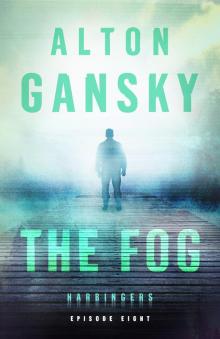 The Fog
The Fog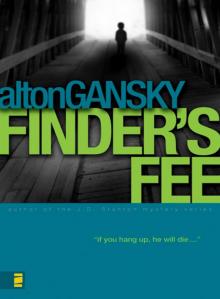 Finder's Fee
Finder's Fee Wounds
Wounds End Game (Harbingers Book 20)
End Game (Harbingers Book 20)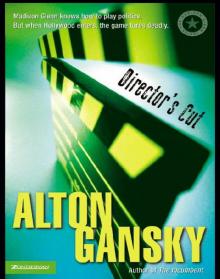 Director's Cut
Director's Cut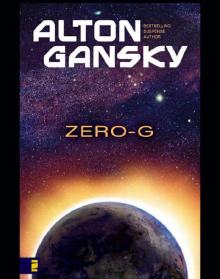 Zero-G
Zero-G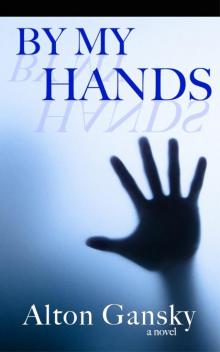 By My Hands
By My Hands The Village (Harbingers Book 12)
The Village (Harbingers Book 12) Beneath the Ice
Beneath the Ice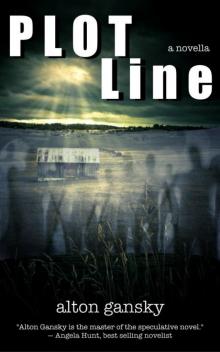 Plot Line
Plot Line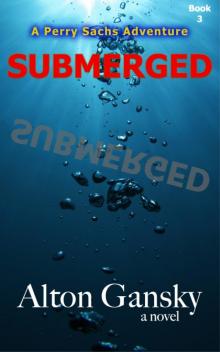 Submerged
Submerged A Treasure Deep
A Treasure Deep